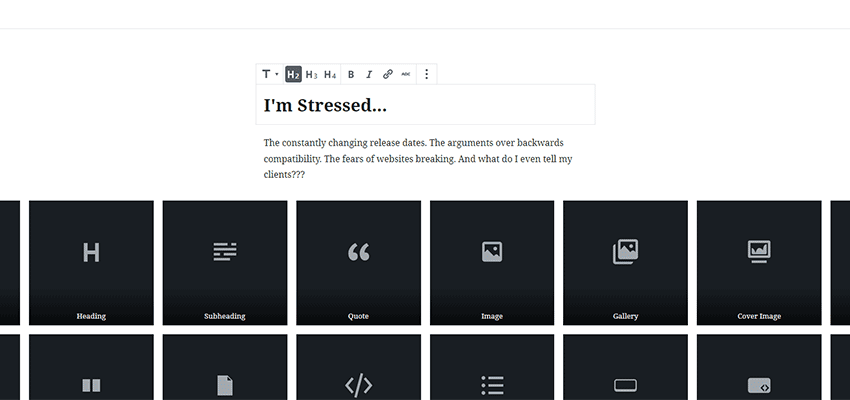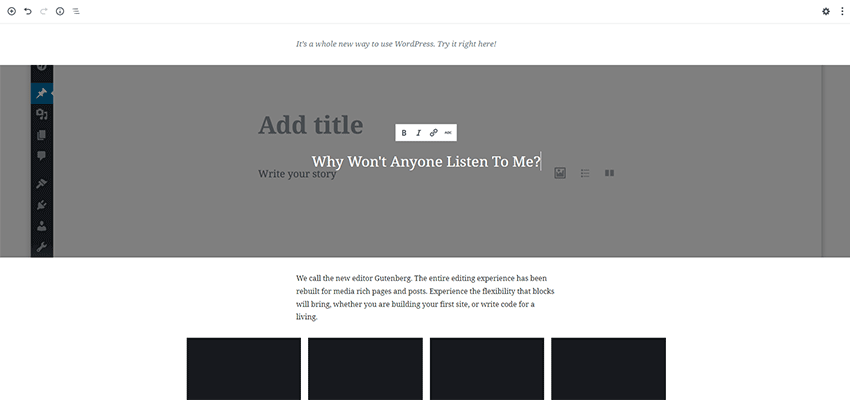2018 has certainly been an exciting year for WordPress. The CMS celebrated its 15th birthday and released its revolutionary version 5.0, featuring the new Gutenberg block editor. It seemed like there was something new to discuss on a daily basis. A lot of it was controversial.
As someone who uses WordPress and cares about its future, I followed the process to develop and release version 5.0 closely. There were all kinds of dramatic twists and turns in the story. Timelines for the release continually shifted, the choice of using React.js was put in doubt due to licensing issues and accessibility concerns arose.
So much was left up in the air and many of us on the outside were left to scratch our heads. That lack of certainty led many members of the community to vent their frustrations in one way or another. Personally, I took a liking to Gutenberg but was a bit perplexed by how everything was unfolding.
An Undue Burden
To be blunt, the whole situation was stressful. And, judging by the social media and blog posts I read, there were others who felt similarly.
For me, much of the concern was how this was all going to affect both my clients and workflow. Not knowing when Gutenberg would be released brought a fear of not being fully prepared for the change. And it also provided an air of uncertainty with projects currently under development. Should I build them with Gutenberg or keep the Classic editor?
To a certain degree, we build websites knowing that they aren’t going to last forever. Software changes and our tools of choice are subject to change. But this experience compressed everything into a day-to-day drama that wreaked havoc on my thought process.
And, now that WordPress 5.0 has finally come out, I wonder if I wasted too much brain power (of which I have very little in reserve) worrying about this whole thing. I also question why it had me so worked up in the first place.

The Need to Have Our Voices Heard
WordPress is billed as a means to “democratize” publishing. And that in itself makes me think about having a voice (however small) in its future direction. Seeing the somewhat chaotic way 2018 unfolded left me feeling completely out of control – even though I really didn’t have any to begin with.
But the uncertainty surrounding this release made it nearly impossible for designers and developers to accurately communicate the changes with clients. If we didn’t know what was happening, how could we pass reliable information on to anyone else?
I think that’s why some people chose to speak out in whatever form they thought necessary. While WordPress is free software, many of us make a living with it. So, it’s reasonable to be concerned when you’re unsure of the effect impending changes will have on you or even when they will occur at all.
In the end, though, all the worrying did was make daily life that much more difficult. Watching my Twitter feed in the days leading up to the final release only heightened the sense of tension I felt.
The unhealthy mix of anger, frustration and messages of impending doom made me dread waking up on release day. I wonder how many of my fellow freelancers felt the same way.

The Beauty of Willful Ignorance
It’s important to know what’s going on. Whether it’s world events or changes to your favorite CMS, knowledge is preferable to the alternative.
Participation is also crucial. If those who develop WordPress don’t know how we’re using it and what our concerns are, they’re not going to have the information they need to make the right decisions.
But I believe there is a line between involvement and unhealthy obsession. Getting caught up in the daily minutiae, at least as an outsider, seems very much counterproductive. Why waste energy on something I have zero control of?
In the year ahead, I want to make a change. I’m still going to pay close attention to the latest happenings in the world of WordPress. But I’m not going to sweat all the inner-politics of how things get done. I’ll let that to those who are directly involved.
Instead, I plan to focus on using the software to the best of my abilities while continuing to evolve with it. That is, after all, the fun part. And it’s why I started using WordPress in the first place.
Related Topics
Top